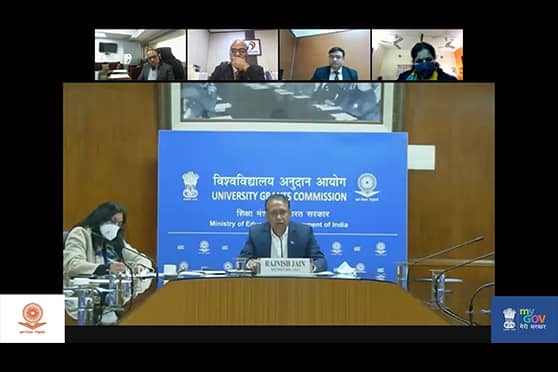UGC conducts webinar on cybersecurity empowerment


The University Grants Commission (UGC) conducted a webinar on 'Cybersecurity Empowerment of Higher Education Institutions' on January 13, 2022. UGC took this initiative with an effort towards making cyber security more accessible, available, and adaptable for Higher education institutions.
Rajnish Jain, secretary, UGC, welcomed and introduced all the panelists. He set the context for the webinar, stressing on the need for cybersecurity awareness with the increased dependence on IT post pandemic. He also emphasised on the fact that the pandemic has put higher education in cyberspace which has led Higher education institutions to be subject to increased cybersecurity issues. He said that there is a need to understand how cyber security issues may be addressed and how cyber hygiene may be managed.
The keynote address was delivered by Lt. Gen. Rajesh Pant, chief (retd.), national cyber security coordinator, National Cyber Coordination Centre, PMO. He emphasised and reiterated the threat cybercrime poses to the economy and national security. He focused on cybersecurity for Higher education institutions that are based on personal information and intellectual property. He highlighted the structure of institutions that makes them susceptible to cybercrimes and the measures to be taken to address these issues.
Abhishek Singh, CEO, My Gov and president and CEO NeGD, ministry of electronics & information technology, while delivering his address emphasised on the importance of cyber security due to the increased dependency and use of the cyberspace. He also focused on the issues of cybersecurity; cyberattacks, frauds and use of cyber warfare, further emphasising the steps and measures to be taken by to stay safe. He touched upon the various aspects of cybercrimes and measures to be taken and the processes for reporting cybersecurity issues.
Deepak Virmani, deputy secretary, Indian Cyber Crime Coordination Centre (I4C) , cyber and information security division, ministry of home affairs, spoke about the initiatives of the ministry’s CIS and its efforts in controlling cybercrimes. He shed light on the Indian Cyber Crime Coordination Centre schemes (I4C) of MHA that aims to prevent cybercrimes. He discussed in detail the seven verticals of the scheme that also involve the training of police personnel and government functionaries. He further shared about the various portals and helpline numbers that can be availed by the citizens.
Charru Malhotra, coordinator, centre of e-Governance, Indian Institute of Planning and Administration, New Delhi brought out the findings on cybersecurity through analysis of a pre-webinar questionnaire that had been shared with Higher education institutions. She highlighted the current status amongst Higher education institutions about cyber security and their preparedness.
Naveen Chowdhary, National Forensic Science University, Gandhinagar, through his address, shared the cybersecurity threat landscape highlighting cases of compromises on cybersecurity in Educational Institutions, research facilities.
The webinar concluded with a question-and-answer session from the faculty members.